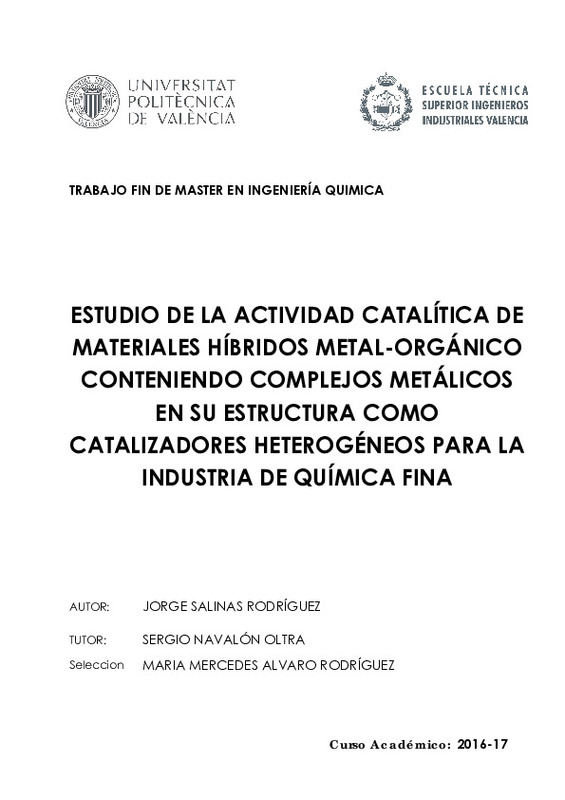|
Resumen:
|
The products of the fine chemical industry have become a fundamental need to maintain current social life. Fine chemicals include pharmaceuticals, flavorings, fragrances, etc. It should be noted that many of the processes ...[+]
The products of the fine chemical industry have become a fundamental need to maintain current social life. Fine chemicals include pharmaceuticals, flavorings, fragrances, etc. It should be noted that many of the processes of preparation of these products generate high amounts of by-products and / or pollutant residues. One of the alternatives for the development of sustainable and less polluting processes is the use of heterogeneous catalysts. In this context, the hybrid metal-organic materials called MOFs that emerged in 2006, characterized by being crystalline and highly porous, have high potential for their use as heterogeneous liquid phase catalysts for reactions of interest to the fine chemical industry. In the present Master Final Work the catalytic activity of materials type MOF based on the family UiO-67 (Zr) (UiO: Universitetet i Oslo) has been studied. In particular, the influence of the presence of metal complexes based on bipyridines coordinated with metals (Cu2+, Co2+ and Fe3+) has been studied, acting as organic ligands of the MOF in the catalytic activity. The reaction studied has been the oxidation of indane in the absence of solvent and exclusively using molecular oxygen as an oxidizing agent. In general, the results indicate that the presence of the metal complexes in the MOF structure improves the catalytic activity. Among all the materials prepared, by pre- or post-synthetic methods, the material prepared by the pre-synthesis method using cobalt has proved to be the most active. The higher activity of this catalyst has been attributed to the high crystallinity, pore volume and surface area with respect to the other catalysts prepared. In addition, the material can be reused without appreciable loss of its catalytic activity.
[-]
Los productos de la industria química fina se han convertido en una necesidad fundamental para mantener la vida social actual. Los productos de química fina incluye a productos farmaceúticos, aromizantes y saborizantes, ...[+]
Los productos de la industria química fina se han convertido en una necesidad fundamental para mantener la vida social actual. Los productos de química fina incluye a productos farmaceúticos, aromizantes y saborizantes, fragancias, etc. Cabe comentar que muchos de los procesos de preparación de estos productos generan cantidades elevadas de subproductos y/o residuos contaminantes. Una de las alternativas para el desarrollo de procesos sostenibles y menos contaminantes es el empleo de catalizadores heterogéneos. En este contexto, los materiales híbridos metal-orgánico llamados MOFs surgidos en 2006, caracterizados por ser cristalinos y altamentes porosos, tienen elevado potencial para su empleo como catalizadores heterogéneos en fase líquida para reacciones de interes para la industria de química fina. En el presente Trabajo Final de Master se ha estudiado la actividad catalítica de materiales tipo MOF basados en la familia UiO-67(Zr) (UiO: Universitetet i Oslo). En particular, se ha estudiado la influencia de la presencia de complejos metálicos basados en bipiridinas coordinadas con metales (Cu2+, Co2+ y Fe3+) actuando como ligandos orgánicos del MOF en la actividad catalítica. Las reacción estudiada ha sido la oxidación de indano en ausencia de disolvente y empleando exclusivamente oxígeno molecular como agente oxidante. En general, los resultados indican que la presencia de los complejos metálicos en la estructura del MOF mejora la actividad catalítica. Entre todos los materiales preparados, por métodos pre- o post-sintéticos, el material preparado por el método pre-síntesis empleando cobalto ha resultado ser el más activo. La mayor actividad de este catalizador ha sido atribuida a la elevada cristalinidad, volumen de poro y área superficial respecto al resto de catalizadores preparados. Además, el material puede ser reusado sin pérdida apreciable de su actividad catalítica.
[-]
|







